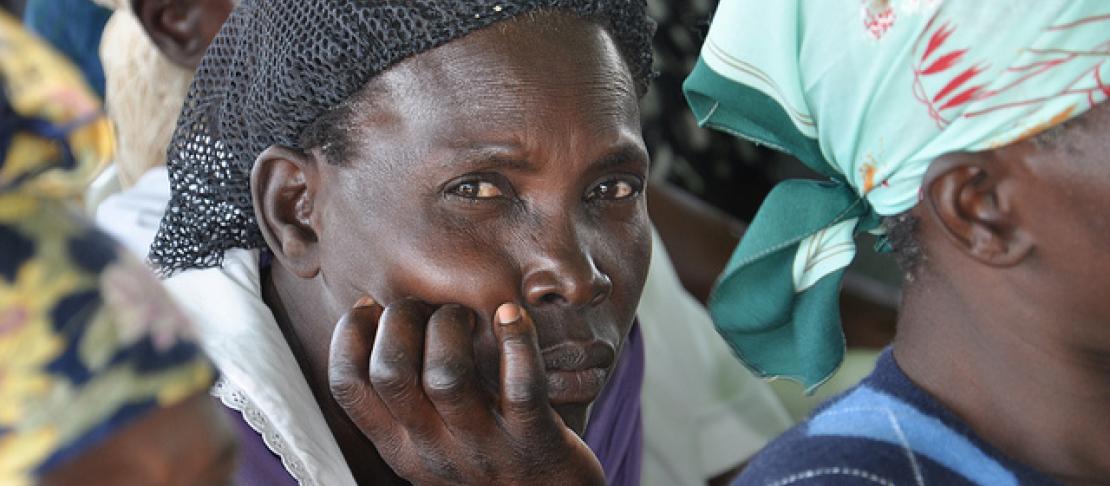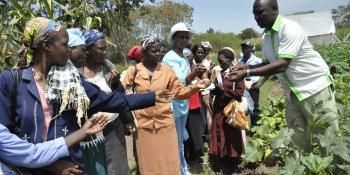Influencing policy through action research in Climate-Smart Villages

Every three years, the Forum for Agricultural Research in Africa (FARA) brings together various players in the African agricultural arena for the Africa Agriculture Science Week (AASW). This Monday saw the kick-off of AASW6 in Accra, Ghana, themed “Africa Feeding Africa through Agricultural Science and Innovation”.
Under climate change, sub-Saharan Africa faces risks to food production, increased heat extremes, droughts and changes to vegetation. To help arm Africa against these problems, the CGIAR Research Program on Climate Change, Agriculture and Food Security (CCAFS) is in Ghana to share lessons and successes from our participatory action research project: ‘Climate-Smart Villages‘ (CSV’s). During a side-event, we explained the Climate-Smart Villages approach, which is being implemented across various CCAFS sites in East and West Africa.
Climate smart agriculture demystified
Climate-smart agriculture is a key aspect of the villages, explained Dr. Jules Bayala of the World Agroforestry Centre (ICRAF). It entails “proven practical techniques - such as mulching, intercropping, conservation agriculture, crop rotation, integrated crop-livestock management, agroforestry, improved grazing, and improved water management - but also innovative practices such as better weather forecasting, early warning systems and risk insurance”.
In Lower Nyando, Kenya, the CCAFS East Africa team has been working with ICRAF, as well as World Neighbors, the Kenya Ministry of Agriculture, ICRAF and Vi-Agro-forestry to promote agro-forestry in the villages. By teaming up with local community based organizations (CBOs), CCAFS has successfully been able to increase tree covers on village farms, a simple measure which has important roll-on effects like increasing carbon retention, improving soil fertility and controlling soil erosion and land degradation. What’s more, these trees can be used as fuel wood and fodder. Thanks to a selection of fast growing trees which grow well under stressful water conditions, such as the Grevillea robusta, Casuarina, Croton, Markhamia lutea, and Gliricidia; villages can start reaping benefits in years, rather than decades.
These partnerships have resulted in the establishment of 22 nurseries that have produced over 50,000 high quality tree seedlings with a 75% tree survival rate. More than half of these nurseries are owned by women who make extra income from the sale of seedlings. In this way, planting trees also helps women, who are the providers in the family, to manage climate risk by diversifying their livelihood options, giving them the power to send their children to school and buy more nutritious food for the family.
Creating an enabling policy for Climate-Smart Agriculture
Climate-smart agriculture is about getting existing technologies off the shelf and into the hands of farmers and developing new technologies such as drought or flood tolerant crops to meet the demands of the changing climate. But a lot more is required. It is also about creating an enabling policy environment for adaptation. This is why CCAFS, together with the Common Market for Eastern and Southern Africa (COMESA) and the African Climate Policy Centre (ACPC), are leading initiatives aimed at including agriculture in climate change policy discussions at national, regional and international levels.
Read more: Push for agriculture within climate change discussions continues
During the side event, Dr. Woldeamlak Bewket, an Associate Professor from the Addis Ababa University discussed how CCAFS East Africa is using a knowledge learning and exchange platform to inform decision making. Through the platform, the AGN, agricultural and climate scientists and academia, are developing a technical paper and a position paper for the AGN on agriculture and climate change, which will be used during COP19 in Warsaw, Poland, later this year.
Continuous learning
CCAFS and its partners continue to monitor and evaluate activities in the villages. Valuable insights continue to emerge and these enable us to improve on the initiatives as we scale up the practices and the Climate-Smart Village model as a whole. This way, we ensure the solutions to feeding Africa are home grown.
Learn more about Climate-Smart Villages in Africa:
Blog Story: Kenyan farmers battle hunger with chicken, goats and bees
Blog Story: In Senegal, farmersuse forecasts to combat climate risks
Plus see all the presentations from the CCAFS side event at AASW: Climate Smart Villages in Africa - Opportunities for farmers and communities
Vivian Atakos is a Communications Officer for the CCAFS East Africa regional office. CCAFS is currently at the Africa Agriculture Science Week in Accra, Ghana.
Follow us live from the Africa Agriculture Science Week (#AASW6) on our blog and Twitter.



